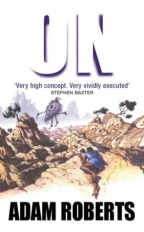Science fiction and fantasy are often about taking the world we
know and "turning it on its side". Lots of writers do this in all
sorts of ways; magic works and science doesn't, for example, or
vampires are real. But nobody has ever quite done what Adam Roberts
does in 'On' -- turn the world literally on its side. He does so by
carefully creating a gritty, detailed point of view, setting up rules
and sticking to them, and intriguing the reader with an almost
archetypal SF mystery. How did the world get this way? Why does it
work like this? And, like any mystery writer, Roberts plays fair,
giving the reader clues as to the nature of the mystery. Most
importantly, he creates his mysterious world and then lets us in on
the magnificent secret through the eyes of his to start with
naïve character. It's an incredible point of view. You get to
see the world from above the wall.
Tighe is a prince in his village on the worldwall, but it doesn't
mean much. Life is hard, a scrabble for every goat, every bit of
bread, every insect he and his family are able to catch and eat. The
wall rises above them farther than they can see and falls below them
farther than they can see. 'On Tighe's eighth birthday one of the
family goats fell off the world. This was a serious matter.' Though a
prince, Tighe's father performs menial work for other villagers. His
mother is unstable, prone to furious rages and beating her son with
whatever might come to hand. With luck, Tighe might one day inherit
the family goats, his father's life. Tighe is not lucky; he's
special. He falls off the world -- and survives.
What he finds is another part of the Wall, with larger ledges,
bigger crevices, more people than he could ever have imagined, doing
something he could never have imagined -- following the War Pope to
war. But life is no easier in this realm than it was in his village.
The imagination behind human cruelty knows no bounds, and Tighe has
no expectations that it could be anything more or less than he is
shown. Roberts uses his youthful, naïve character to introduce
us to a world that is at once familiar and literally on its side. His
careful, clean prose creates for us an existence that seems as
casually violent as the real world, as primitive as parts of our
world are today.
But there are clues there, bits of plastic and technology that
suggest this world was once different. (There is also an appendix
that should definitely be left until AFTER the reader has finished
the book.) Once Roberts has thoroughly grounded us in his unique
vision, he begins the second twist, to turn the readers' new world,
Tighe's daily struggle, into something more, a grand thought
experiment. There's a reason the World is a wall. Yes, life is
precarious, but there's more, much more. Roberts can tell us
everything, and he does. It's a joyous, terrifying revelation.
